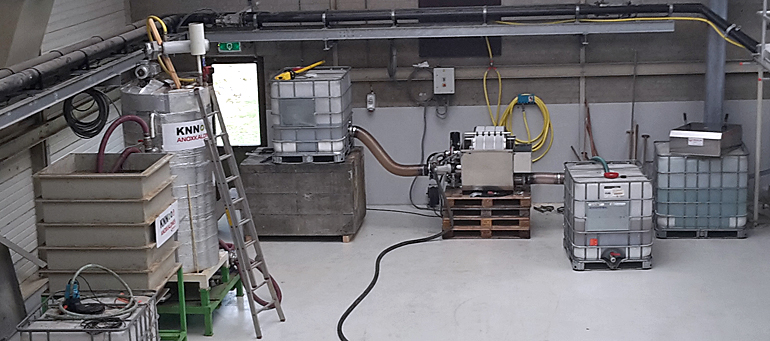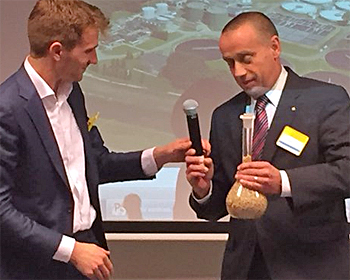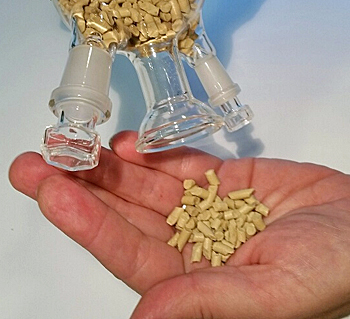Brabantse Delta hands over first kilo PHA biopolymer to packaging manufacturer
 Dutch regional water authority Brabantse Delta handed over its first kilo PHA biopolymer granulate to nearby plastic packaging manufacturer Oerlemans Plastics on 22 October.
Dutch regional water authority Brabantse Delta handed over its first kilo PHA biopolymer granulate to nearby plastic packaging manufacturer Oerlemans Plastics on 22 October.
The PHA granulate is produced from sewage sludge at waste water treatment plant Bath, the Netherlands, using a technology developed by AnoxKaldnes, a Swedish business unit of Veolia Water Treatment.
It is for the first time PHA granulate produced from sewage sludge is being used for the production of biodegradable plastic products. In the case of Oerlemans this will be for carrier bags.
 Director Martin Tietema (left) of KNN bioplastics, hands over the first kilo to director Joan Hanegraaf of Oerlemans plastics
Director Martin Tietema (left) of KNN bioplastics, hands over the first kilo to director Joan Hanegraaf of Oerlemans plasticsProduction according to market specifications
Three Dutch regional water authorities, Brabantse Delta, De Dommel en Fryslan, agreed this summer to set up a demonstration plant to produce PHA biopolymer according to the specifications of manufacturers of biodegradable plastic products.
They are joined by research institute Stowa and sewage sludge treatment company SNB, consultancy firm KNN and technology supplier AnoxKaldnes/Veolia.
At wwtp Bath an acidification reactor (see photo above) has been built that now produces a few kilo PHA biopolymer per week.
The coming 10 months the production will be fine-tuned to meet the customer quality requirements.
Later the production capacity will be raised to 100 ton per year.
Further optimisation
The Cella-technology developed by AnoxKaldnes has been tested to produce PHA biopolymers from various waste streams. The first tests with sewage sludge were carried out at wwtp Brussels North, Belgium.
Last year a first full scale reference plant was tested in Leeuwarden, the Netherlands, using residual waste water from sugar producer Suikerunie.
Prior to scaling up to a fully commercial PHA-production plant from sewage sludge, production will be optimised at wwtp Bath to be able to investigate the full market potential of this raw material.
 PHA biopolymer ganulate produced from sewage sludge.
PHA biopolymer ganulate produced from sewage sludge.
Excellent source
Waste water has proven an excellent source for bacteria that produce polyhydroxyalkanoate (PHA). Volatile fatty acids from the activated sewage sludge serve as a carbon source for biopolymer synthesis.
Studies indicated that it should be possible to produce PHA-rich biomass - without PH-processing, crude product - for a selling price of 2,5 euro per kilo.
This is considered an interesting market price to compete with petroleum-based PHA polymers.
Energy and recovery factories
The demontration project at wwtp Bath is part of the joint Energy & resource factory initiative by all 23 Dutch regional water authorities.
Eight Dutch municipal waste water treatment plants have already been transformed into Energy factories, producing an energy surplus. Preparations for a further nine factories are underway.
The Energy & resource factory initiative also includes the recovery of raw materials. Phosphate is already being recovered at seven Dutch municipal treatment plants.
Additionally pilots are being conducted to recover cellulose for asphalt industry, PHA for plastic industry, alginate as thickener for chemical industry and CO2 as fertilizer for green house industry.
Read also on this website
● Demosite wwtp Leeuwarden hosts pilot plant using Swedish recovery technology for biopolymers, 29 January 2014
● BWA Water wins WssTP European Water Innovation Award 2015, 30 June 2015
More information
Waterschap Brabantse Delta
Breda, the Netherlands
+31 76 564 1000
www.brabantsedelta.nl
Energy & resource factory initiative
info@energiefabriek.com
www.efgf.nl/english
Introduction video on sewage mining by Dutch regional water authorities.



